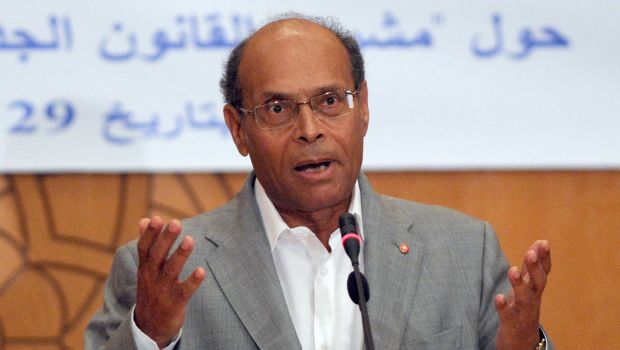
Tunisia’s President Moncef Marzouki delivers a speech during a seminar with Tunisian officials and legal experts discussing the reinforcement of a law against “terrorism” in Tunis on October 29, 2013. (AFP PHOTO/FETHI BELAID)
Tunisia under Zine El-Abidine Ben Ali had its propagandists and organic intellectuals, like any regime would. Many of them served Ben Ali and his Constitutional Democratic Rally (RCD) party, consolidating his power locally and abroad. Some of those polished his image under duress; others did so willingly. Many were overzealous in the job. Tasks ranged from signing laudatory articles and denouncing colleagues’ remarks against the regime to attacking opposition leaders in the foreign media.
Their archives were kept in the Presidential Palace, where Ben Ali established a parallel government to control the various ministers and officials. But when the president fled in January 2011, he was replaced by another RCD figure, Fouad Mebazaa, until the election of Moncef Marzouki in December of the same year. Somewhere in between, those archives were partially destroyed, either on direct orders from Mebazaa or by former regime cells still active in the administration.
[inset_left]The president publicly exposed many corrupt individuals and companies that had escaped the people’s justice until now. But amid Tunisia’s polarized crisis, the Black Book is just an extra complication that is causing him to lose his conciliatory status.[/inset_left]
Marzouki’s team found many shredded and scattered documents. Nevertheless, they were able to collect enough intact papers and videos to form an approximate record of Ben Ali’s propaganda system. Their early statements evoked a future collaboration with the Ministry of Transitional Justice, the Syndicate of Journalists, historians, archivists, and others, in order to study the archives to decide the fate of the individuals involved in the propaganda machine. So when the Presidency of the Republic of Tunisia published The Propaganda Apparatus Under Ben Ali: The Black Book in the first week of December 2013, many showed their shock and surprise—and, later, their anger.
The book has 354 pages. It lists hundreds of names of those allegedly involved in Ben Ali’s propaganda efforts. It tells stories of bribery, treachery, fraud, doublespeak and more. One of the cases it mentions involves a famous journalist on a trip abroad allegedly proposing to denounce any Tunisian “tarnishing the reputation of our great President.” In another, the director of a newspaper supposedly asked Ben Ali for a piece of land in the upper-class northern suburbs of Tunis in return for favorable coverage in the paper. Several media outlets, both local and foreign, were supposed to have received thousands of dollars to play a part in Ben Ali’s propaganda web.
The current Presidency’s argument for publishing the book was simple: “Transitional justice is very slow [and] counterrevolution is advancing, [so] we decided to move forward.” It is true that the book helped to uncover many “neo-revolutionaries” who were in fact liars and informants who hijacked the public arena after January 2011 and stood up as the revolution’s spokespeople. It also sheds light on a system that everyone knew about, but which remained clouded by rumors and mysteries.
Yet the fact is that Tunisia entered a transitional process in January 2011, not a revolutionary one. There was a continuation of many pre-existing structures, although a new ministry was created to handle transitional justice. True, its work has progressed slowly, but gradualness is the price justice demands. Tunisia, on the other hand, is in the middle of a deep political crisis, and the national dialogue that started in September is about to collapse. It is the Presidency’s duty to be neutral and unifying, and its role as a mediator is needed these days. Publishing the book was one-sided and divisive.
The Black Book, hastily compiled, oddly leaves out a number of famous pro-regime journalists and does not differentiate between the true propagandists—those who were satisfied with their job—and the victims, who were obliged to abide by the orders of the regime. Of many those named in the book are still alive, and it is a blow to the families of those who have recently passed away. While several pages of the book paint President Marzouki as a victim, other opponents of Ben Ali—opponents who were just as, if not more, important than Marzouki—figured in mere paragraphs, and even in derogatory passages.
Moreover, those mentioned in the book are influential opinion-makers, and they have thousands of followers and supporters. The campaign they are waging against Marzouki and his team today amounts to a real media war, with the accompanying daily scandals. Some have threatened to sue him. The majority of the intellectual class condemned the publication, as did many of Ben Ali’s harshest critics, and even officials inside the ruling troika that currently holds power. The president seems isolated in this fight. His (tiny) party is backing him, as are a few revolutionary factions, but they have little clout. He has started a battle he cannot win.
The president publicly exposed many corrupt individuals and companies that had escaped the people’s justice until now. But amid Tunisia’s polarized crisis, the Black Book is just an extra complication that is causing him to lose his conciliatory status.
What pushed Marzouki to allow the book’s publication? It might be, as his aides claim, a desire to accelerate the transition. It could also be, as the journalists say, revenge against their harsh criticism of him. But he might also be responding to a reality: pressed to resign by opponents and allies and mocked by the press and civil society, Marzouki wanted to throw one last trick before vanishing. He will certainly be remembered for his Black Book.
This article was originally published in The Majalla.
All views expressed in this blog post are those of the author and do not necessarily represent the views of, and should not be attributed to, The Majalla magazine or Asharq Al-Awsat newspaper.
